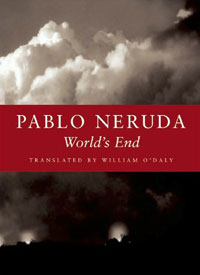The Postman Rings Twice

Perhaps it is inevitable that a giant like the Nobel laureate and Chilean poet Pablo Neruda suffers posthumous paper cuts at the hands of academic scolds such as Ilan Stavans (who mocks and scorns the poet as a Stalinist stooge). Happily, we have also been graced with the posthumous publication of a number of volumes of Neruda’s poetry via the inimitable Copper Canyon Press, most recently World’s End (Fin de mundo), translated by William O’Daly (who has also translated the earlier volumes Still Another Day, The Separate Rose, Winter Garden, The Sea and the Bells, The Yellow Heart, The Book of Questions, and The Hands of Day).
This handsomely printed bilingual edition contains a book-length poem that O’Daly introduces with:
Fin de mundoCanto general
World’s End
Some samples:
The Rose
Seas
The Wounded
